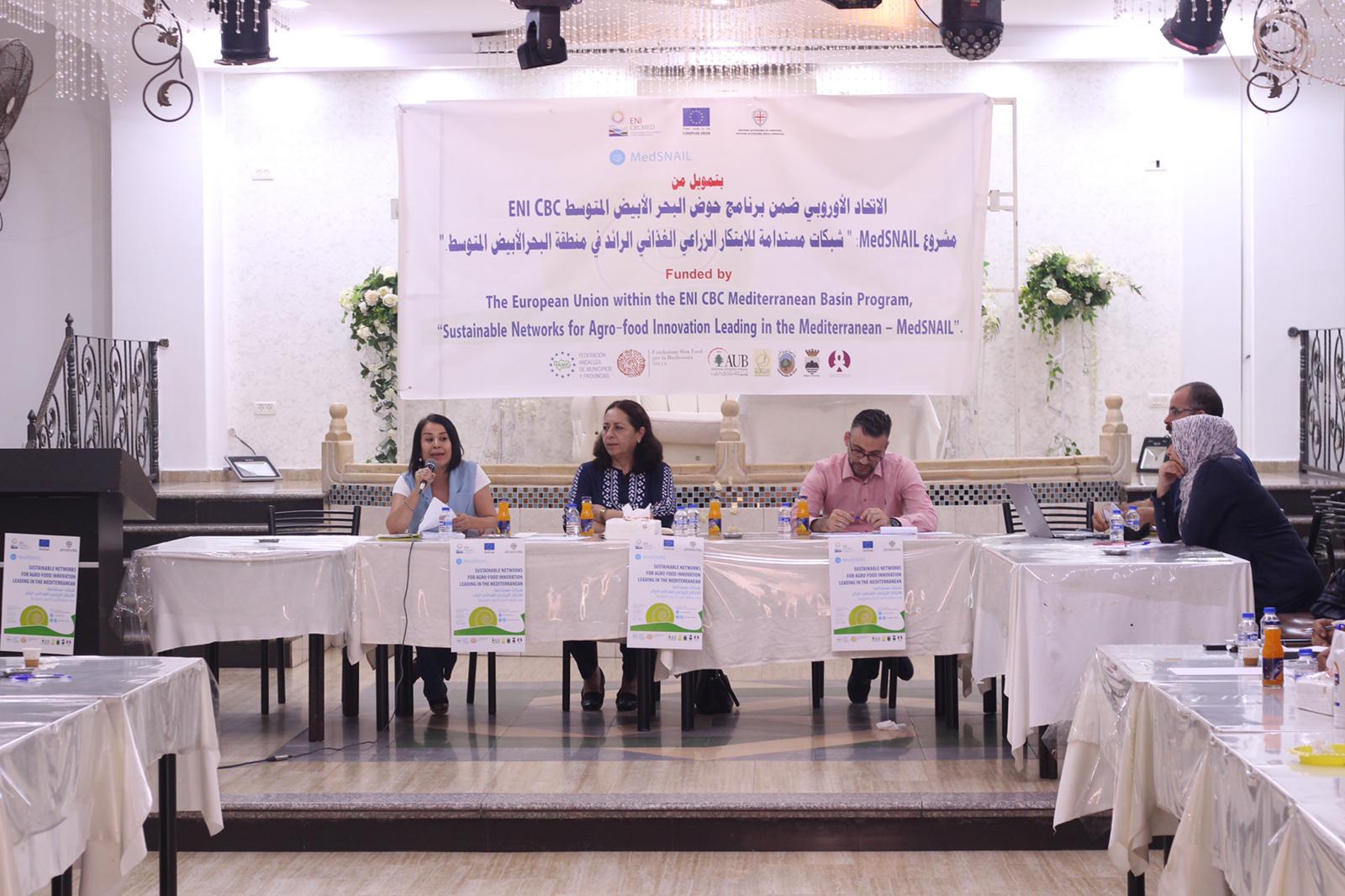
workshop to present a study of agro-food diversity in Jenin Governorate Areas
workshop to present a study of agro-food diversity in Jenin Governorate Areas.
Within the activities of the MedSNAIL project, “Sustainable Networks for Agro-food Innovation Leading in the Mediterranean – MedSNAIL”. Funded by the European Union within the ENI CBC Mediterranean Basin Program, and the lead partner of the Andalusian Federation of Towns and Provinces (FAMP).
The Rural Women’s Development Society organized a workshop to present a study on agro-food diversity in Jenin Governorate Areas, with the participation of more than 70 participants, on Monday, 23/8/2021.
This workshop comes within the framework of the joint regional program in the countries of the Mediterranean Basin to improve and encourage socially and environmentally sustainable methods of agriculture and production, and to strengthen and develop agricultural food value chains, targeting small-scale producers.
The workshop was inaugurated by Mrs. Hanin Zeidan the General Director of RWDS, and a Steering Committee member of the MedSNAIL project. She welcomed the participants, and she spoke about the importance of the project on a national level, in addition to the project objectives; of promoting socially and environmentally sustainable development for small and medium-sized economic initiatives, in the field of agro-food, and through the evaluation of traditional products based on Euro-Mediterranean “SLOW Food” methodology, and its short chain principles.
As well as its specific objectives of providing advisory services, support sessions and training to local actors (small and medium agro-food business and public authorities), in order to raise awareness about SLOW Food principles, and to identify new routes for sustainable development, beyond major economic trends, and stimulates rural development while preserving heritage and local identity.
Following the workshop opening speech. Mrs. Amal Adib, an associate member of the "Sharaka Group Initiatives," has spoke about the initiative; that was established in 2009 in the cities of Ramallah and Al-Bireh, to preserve the Palestinian agricultural and environmental heritage by rebuilding the direct relationship "partnership", between the farmer and the consumer, and encouraging ethical patterns, both in production or in consumption. Mrs. Adeeb talked about the ambition of “Sharaka” to promote and revive, environmentally, and human-friendly agricultural methods, with the aim of achieving food sovereignty in Palestine. She presented partnership activities, such as the farmers’ market in partnership with the Al-Bireh Municipality, and she focused on the need to provide healthy food to fight diseases, and to find innovative solutions for marketing, and to transfer these experiences with other Palestinian governorates and regions.
During the workshop, a short film was shown about food production in the town of Anza in Palestine (popular foods such as Jaja'a Al-Ja'dah and Qaraqish with olive oil), with the participation of members of the Women's Club of the Rural Women's Development Society in the town of Anza-Jenin.
After that Mr. Amin Juaidi, Communications Officer and Project Coordinator at RWDS, presented the context and objectives of the study, and he has presented a summary of the study that was conducted, in the last quarter of 2020 for the RWDS by the study team lead Agronomist Nasser Qadous. Which aims to identify the products (raw materials, manufactured products, techniques and traditional recipes) in the Jenin region and assess its potential in preserving cultural and ecological heritage, developing nonthreatening regional dynamics from a social, cultural, ecological and economic point of view. Mr. Jaidi pointed out; that a list of identified products was prepared that includes 81 products and crops that have met the standards. The study shows the scientific name, the Arabic name, and the distribution of the product in the Jenin area according to the areas of production.
In addition, Mr. Juaidi pointed out that many of the local varieties that may help preserve agricultural and food heritage are at risk, and that there are advocates and partners who are interested and ready to work together, in an integrative way to preserve these products. Whereas the project's goal stand for strengthening these sustainable and pioneering networks of people with relationship, and experience, in how to preserve and create mechanisms for promoting agricultural food diversity in Palestine.
Later on, the Agronomist Mr. Nasser Qadous, the lead of the research team for the study of agro-food diversity in Jenin governorate, presented the study methodology, excluding its results and outputs. That the agricultural and food heritage in Jenin has many commonalities with other regions in Palestine, yet it has its own specificity, and that the dynamics of cropping pattern in Jenin is ruled by profitability.
Crops, and the plunging of the markets with Israeli and imported crops is behind the sharp drop in some traditional crops production. Besides, he addressed that the study has documented a list of local varieties, indicating the wheat as the most common crop in Jenin for decades. In addition, the agronomist Qadous pointed out that the food heritage in Jenin is rich, and that there is an urgent need for every recipe to be documented and used to improve food security, and to ensure the food sovereignty, especially since most recipes are nutritious and can be produced at a relatively low cost from locally produced ingredients. Among the recommendations emphasized by Agronomist.
Qadous is the importance of promoting traditional recipes of food and sweets at the level of cooperative/women's societies, so that they not only constitute income for them, but also help preserve the food heritage. At a time when the Israelis are trying to register many of the local Palestinian plants and products as an Israeli one.
At the end of the workshop, the discussion was opened to argue the study and its outputs, what could be added and how to take practical steps forward. The participants interacted in the discussion, and they expressed their happiness with such quality workshops, and the presentation method.
To access the study report file and the product list appendix electronically via the link, and by clicking HERE
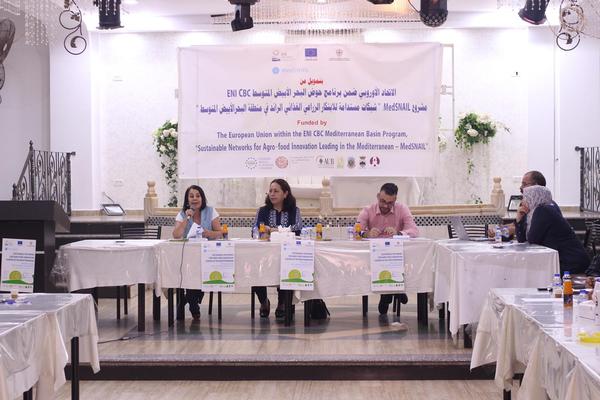
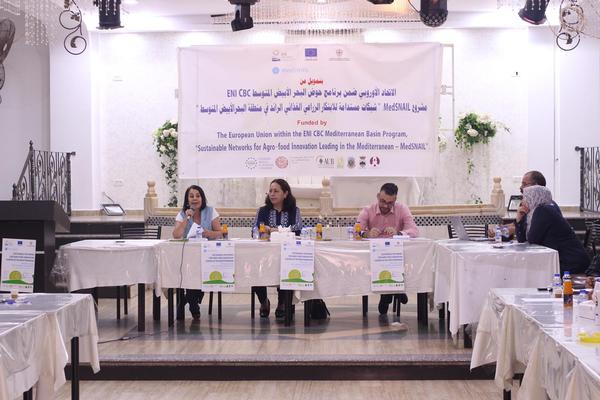
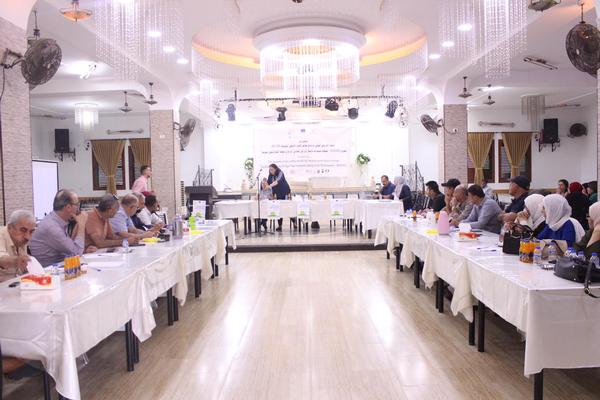
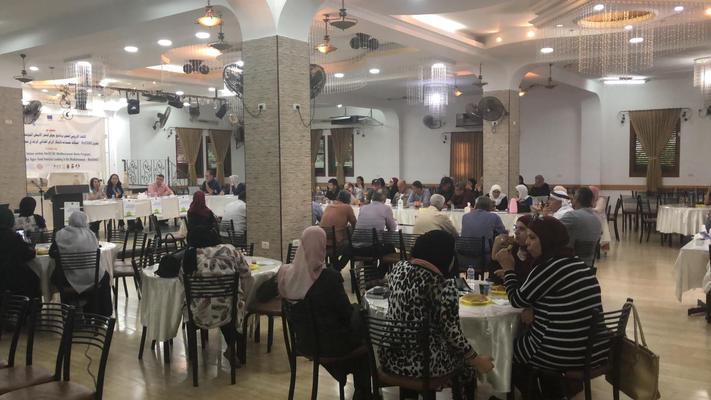
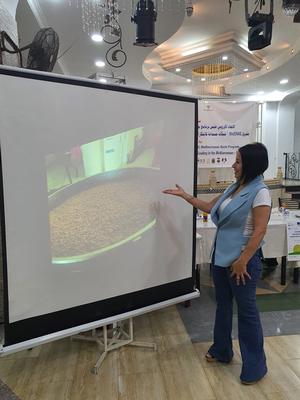
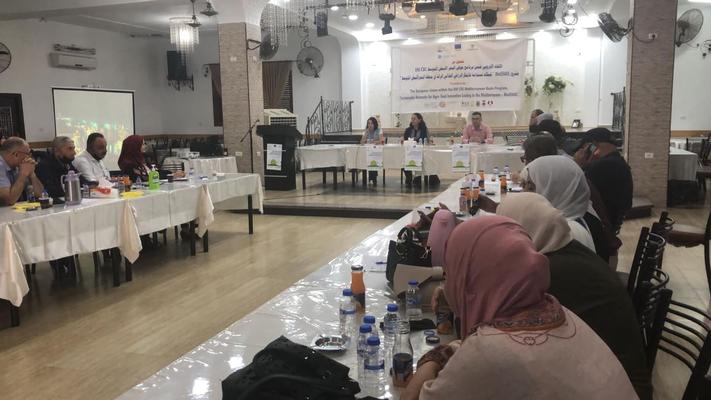
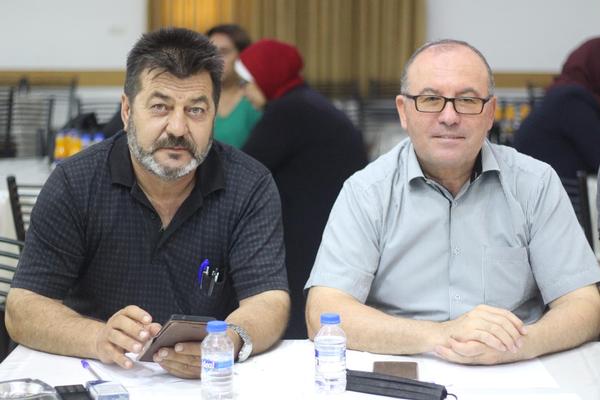
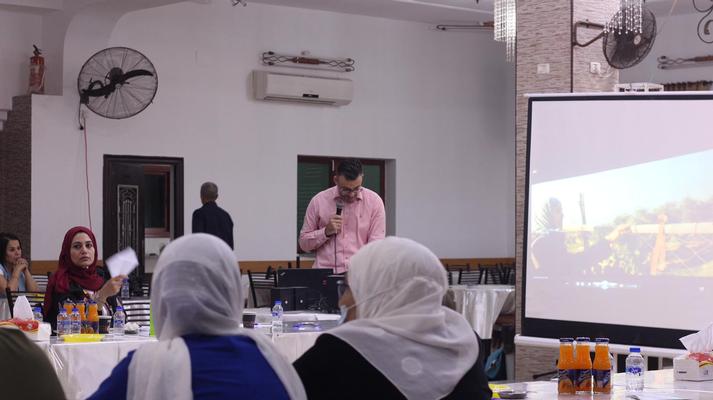
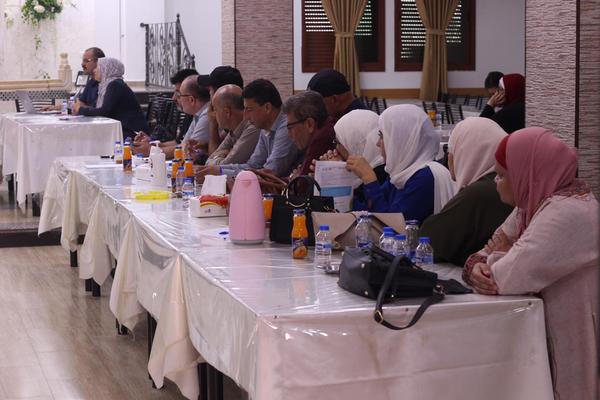
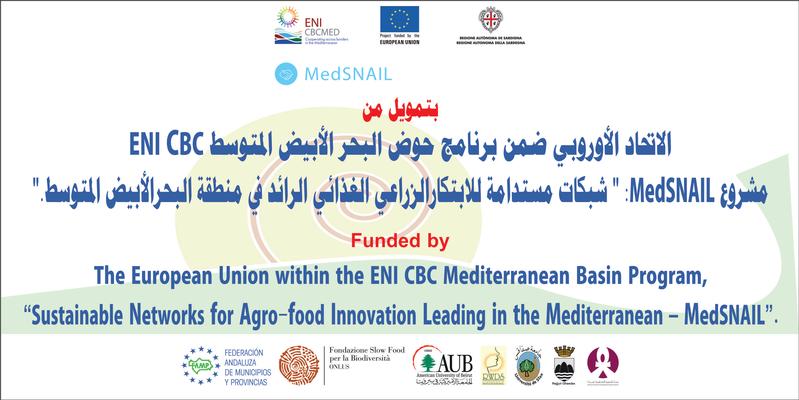
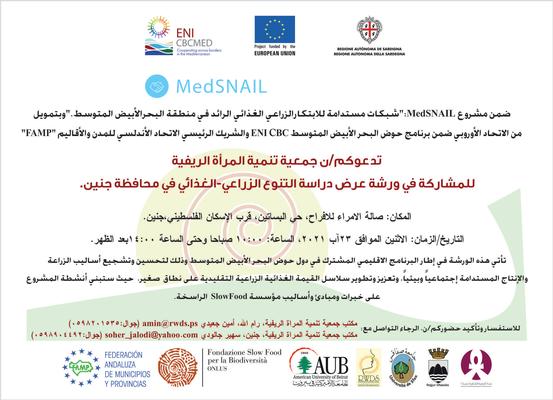
The Rural Women’s Development Society organized a workshop to present a study on agro-food diversity in Jenin Governorate Areas, with the participation of more than 70 participants, on Monday, 23/8/2021.
This workshop comes within the framework of the joint regional program in the countries of the Mediterranean Basin to improve and encourage socially and environmentally sustainable methods of agriculture and production, and to strengthen and develop agricultural food value chains, targeting small-scale producers.
The workshop was inaugurated by Mrs. Hanin Zeidan the General Director of RWDS, and a Steering Committee member of the MedSNAIL project. She welcomed the participants, and she spoke about the importance of the project on a national level, in addition to the project objectives; of promoting socially and environmentally sustainable development for small and medium-sized economic initiatives, in the field of agro-food, and through the evaluation of traditional products based on Euro-Mediterranean “SLOW Food” methodology, and its short chain principles.
As well as its specific objectives of providing advisory services, support sessions and training to local actors (small and medium agro-food business and public authorities), in order to raise awareness about SLOW Food principles, and to identify new routes for sustainable development, beyond major economic trends, and stimulates rural development while preserving heritage and local identity.
Following the workshop opening speech. Mrs. Amal Adib, an associate member of the "Sharaka Group Initiatives," has spoke about the initiative; that was established in 2009 in the cities of Ramallah and Al-Bireh, to preserve the Palestinian agricultural and environmental heritage by rebuilding the direct relationship "partnership", between the farmer and the consumer, and encouraging ethical patterns, both in production or in consumption. Mrs. Adeeb talked about the ambition of “Sharaka” to promote and revive, environmentally, and human-friendly agricultural methods, with the aim of achieving food sovereignty in Palestine. She presented partnership activities, such as the farmers’ market in partnership with the Al-Bireh Municipality, and she focused on the need to provide healthy food to fight diseases, and to find innovative solutions for marketing, and to transfer these experiences with other Palestinian governorates and regions.
During the workshop, a short film was shown about food production in the town of Anza in Palestine (popular foods such as Jaja'a Al-Ja'dah and Qaraqish with olive oil), with the participation of members of the Women's Club of the Rural Women's Development Society in the town of Anza-Jenin.
After that Mr. Amin Juaidi, Communications Officer and Project Coordinator at RWDS, presented the context and objectives of the study, and he has presented a summary of the study that was conducted, in the last quarter of 2020 for the RWDS by the study team lead Agronomist Nasser Qadous. Which aims to identify the products (raw materials, manufactured products, techniques and traditional recipes) in the Jenin region and assess its potential in preserving cultural and ecological heritage, developing nonthreatening regional dynamics from a social, cultural, ecological and economic point of view. Mr. Jaidi pointed out; that a list of identified products was prepared that includes 81 products and crops that have met the standards. The study shows the scientific name, the Arabic name, and the distribution of the product in the Jenin area according to the areas of production.
In addition, Mr. Juaidi pointed out that many of the local varieties that may help preserve agricultural and food heritage are at risk, and that there are advocates and partners who are interested and ready to work together, in an integrative way to preserve these products. Whereas the project's goal stand for strengthening these sustainable and pioneering networks of people with relationship, and experience, in how to preserve and create mechanisms for promoting agricultural food diversity in Palestine.
Later on, the Agronomist Mr. Nasser Qadous, the lead of the research team for the study of agro-food diversity in Jenin governorate, presented the study methodology, excluding its results and outputs. That the agricultural and food heritage in Jenin has many commonalities with other regions in Palestine, yet it has its own specificity, and that the dynamics of cropping pattern in Jenin is ruled by profitability.
Crops, and the plunging of the markets with Israeli and imported crops is behind the sharp drop in some traditional crops production. Besides, he addressed that the study has documented a list of local varieties, indicating the wheat as the most common crop in Jenin for decades. In addition, the agronomist Qadous pointed out that the food heritage in Jenin is rich, and that there is an urgent need for every recipe to be documented and used to improve food security, and to ensure the food sovereignty, especially since most recipes are nutritious and can be produced at a relatively low cost from locally produced ingredients. Among the recommendations emphasized by Agronomist.
Qadous is the importance of promoting traditional recipes of food and sweets at the level of cooperative/women's societies, so that they not only constitute income for them, but also help preserve the food heritage. At a time when the Israelis are trying to register many of the local Palestinian plants and products as an Israeli one.
At the end of the workshop, the discussion was opened to argue the study and its outputs, what could be added and how to take practical steps forward. The participants interacted in the discussion, and they expressed their happiness with such quality workshops, and the presentation method.
To access the study report file and the product list appendix electronically via the link, and by clicking HERE











